This article has been reviewed according to Science X's editorial process and policies. Editors have highlighted the following attributes while ensuring the content's credibility:
fact-checked
peer-reviewed publication
trusted source
proofread
Barnacle bends shape to fend off warm-water sea snails on the move, study shows
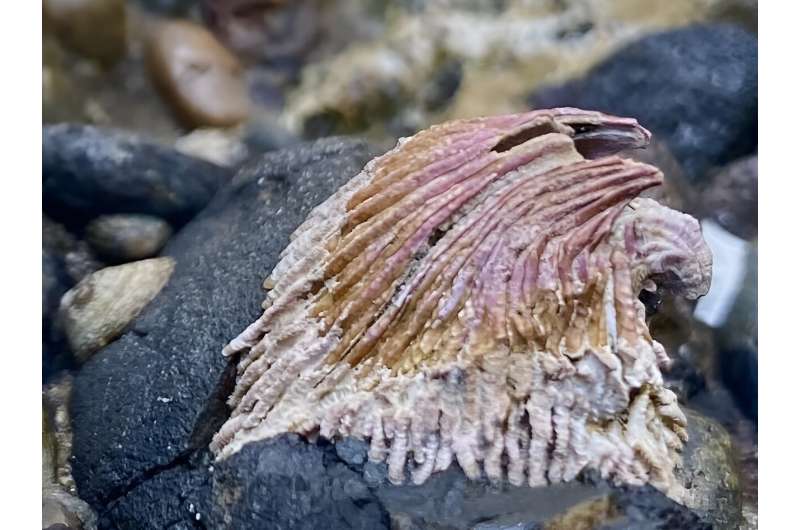
Some barnacles are 'morphing' to protect themselves from predatory warm-water sea snails, which are expanding into their territory due to climate change.
Research led by the University of Southampton and published in the Journal of Biogeography shows how temperate prey species are adapting to changing water temperatures, which carry the threat of warm-water predators encroaching into their territory. The paper is titled "Predator-induced defenses under tropicalization: A biogeographic approach."
As global sea-surface temperatures rise and the number of marine heat waves increase under global heating, coastal marine communities are changing. Warm-water predators that were restricted to subtropical and tropical regions are now establishing themselves in more temperate waters. This phenomenon is known as "tropicalization."
As these predators push out from the equator towards the poles, temperate prey species, like the barnacle Tetraclita rubescens, are encountering new, larger, predators. Researchers wanted to know how this barnacle species might adapt their defenses in response to tropicalization.
Specifically, they studied the prevalence of 'bent morphs'—individual barnacles that morph into a bent shape, obscuring an opening in their shells which can be attacked by predatory sea snails (muricids). Bent morphs have slower growth and lower reproduction than the standard cone-shaped barnacles, but this could be a necessary trade-off in the face of increased predation.
-
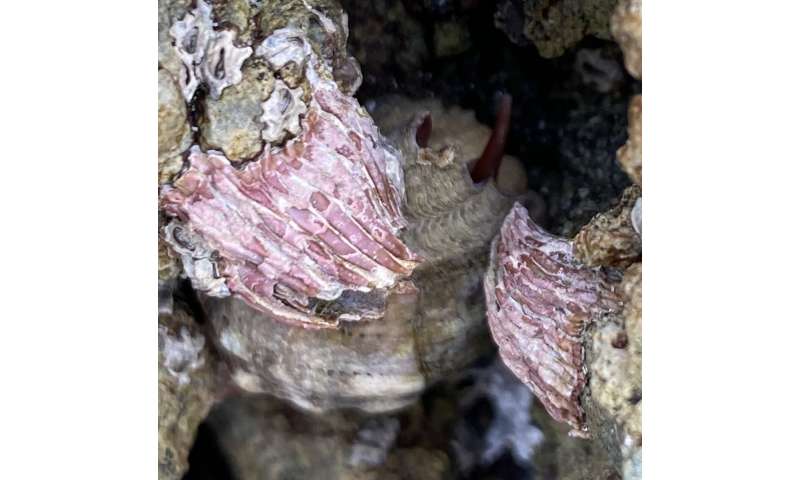
Two bent morphs with warm water predatory snail (Mexacanthina lugubris) in the background. Credit: University of Southampton -
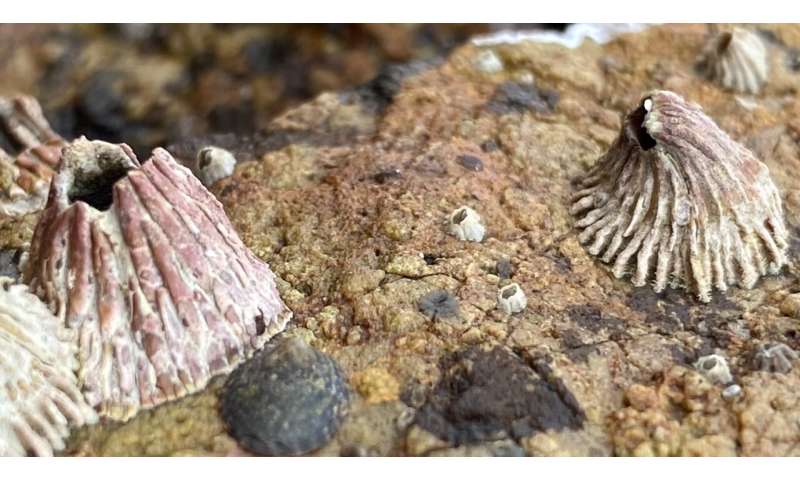
Conic morph (left) and bent morph (right). Credit: University of Southampton
"We found that bent morphs of T. rubescens were more common in the most southern part of its geographic range in the Baja California peninsula of Mexico, which is a region undergoing tropicalization," says Dr. Phillip Fenberg, Associate Professor in Ocean and Earth Science at the University of Southampton and lead author of the research.
"In these waters, T. rubescens barnacles are preyed upon by at least three species of warm-water sea snails which are expanding their geographic range due to rising sea temperatures. These sea snails have large bodies, and some can secrete toxins, making them very effective predators."
The research team studied 30 sites along the Pacific coast of North America—examining over a thousand photographs taken between 2017 and 2022. Using these photographs, they determined the prevalence of bent morphs, as well as their relative size compared to conic morphs. The team also used published research and field surveys to find out how barnacle populations overlap with the range expansion of warm-water predatory sea snails.
Bent morphs were only common along the Baja peninsula of Mexico, where tropicalization is occurring. Here, they made up an average of 29% of the populations. Bent morphs were also significantly smaller than cone-shaped barnacles.
In regions further away (in California, U.S.), bent morphs were absent, suggesting cold-water predatory sea snails don't induce the same morphing defense.
-
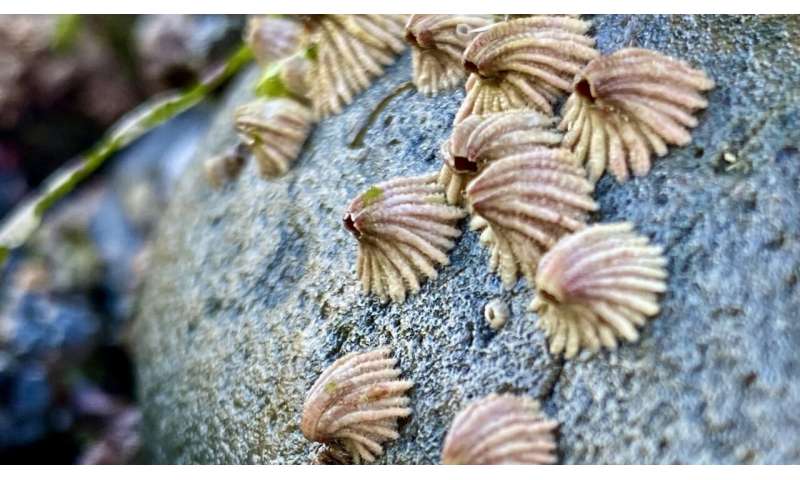
Group of bent morphs on rock face. Credit: University of Southampton -
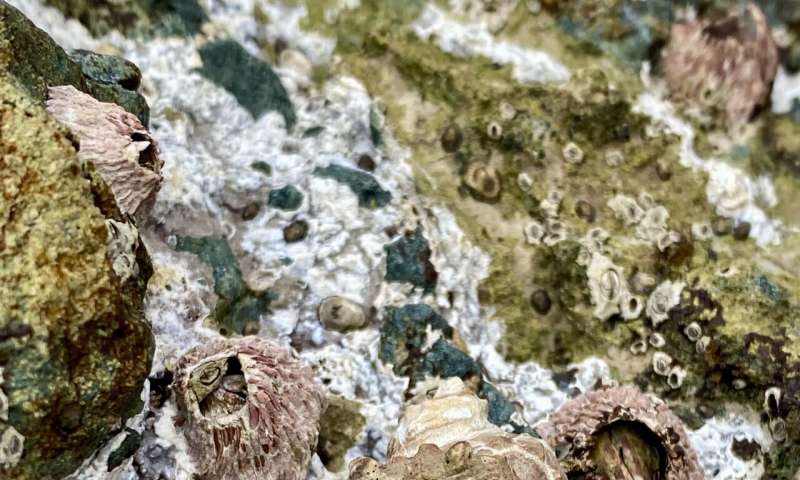
Warm water Plicopurpura columellaris sea snail next to T. rubescens barnacles. Credit: University of Southampton -
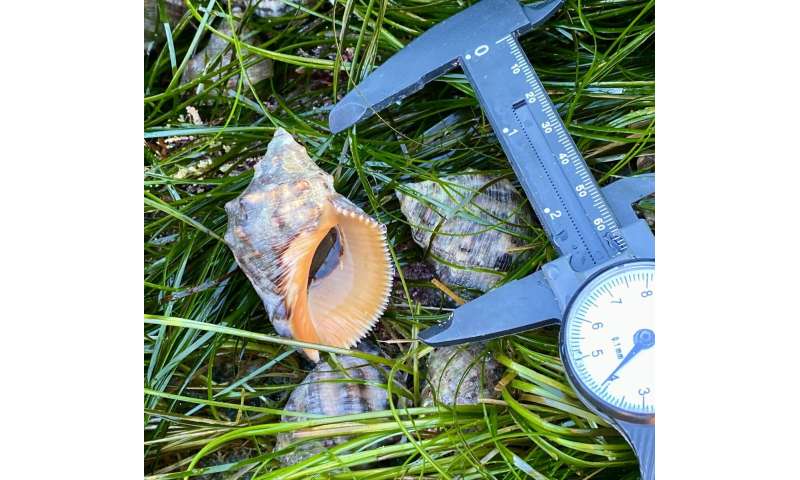
Warm water Stramonita biserialis is larger than more northerly sea snails. Credit: University of Southampton
Karolina Zarzyczny, a co-author of the paper also from the University of Southampton, explains there could be several reasons for this. "The bent morph defense might be unnecessary, ineffective or not possible for barnacles in the cooler regions of its geographic range in California. We know that T. rubescens are preyed upon by cold-water sea snails, but these snails are smaller than their warm-water relatives and might prefer to prey on other barnacle species which pose less of a challenge."
"The bent shape could also be a less effective defense against cold-water predators, who attack their prey differently. Finally, more northerly populations in California may not have the genetic capacity to produce bent morphs, but this has yet to be determined."
The research shows that some species may adapt in surprising ways to tropicalization, which is likely to have a significant impact on marine ecosystems, on top of the direct consequences of warming sea temperatures. The researchers say more research is needed to understand the drivers and consequences of tropicalization on marine ecosystems.
More information: Phillip B. Fenberg et al, Predator‐induced defences under tropicalisation: A biogeographic approach, Journal of Biogeography (2023). DOI: 10.1111/jbi.14716
Journal information: Journal of Biogeography
Provided by University of Southampton




















